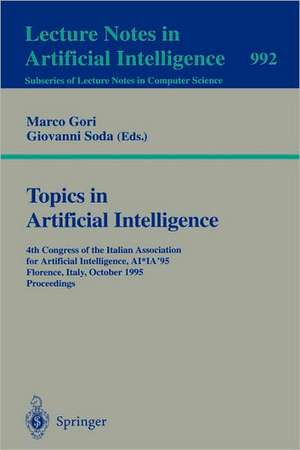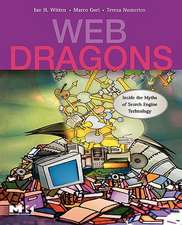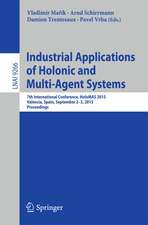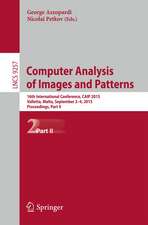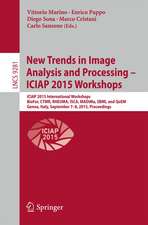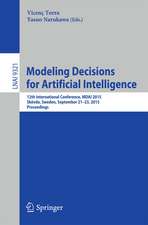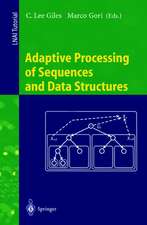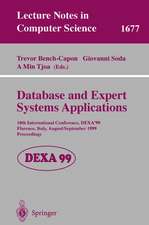Topics in Artificial Intelligence: Fourth Congress of the Italian Association for Artificial Intelligence, AI*IA '95, Florence, Italy, October 11 - 13, 1995. Proceedings: Lecture Notes in Computer Science, cartea 992
Editat de Marco Gori, Giovanni Sodaen Limba Engleză Paperback – 27 sep 1995
The 31 revised full papers and the 12 short presentations contained in the volume were selected from a total of 101 submissions on the basis of a careful reviewing process. The papers are organized in sections on natural language processing, fuzzy systems, machine learning, knowledge representation, automated reasoning, cognitive models, robotics and planning, connectionist models, model-based reasoning, and distributed artificial intelligence.
Din seria Lecture Notes in Computer Science
- 20%
 Preț: 1061.55 lei
Preț: 1061.55 lei - 20%
 Preț: 307.71 lei
Preț: 307.71 lei - 20%
 Preț: 438.69 lei
Preț: 438.69 lei - 20%
 Preț: 645.28 lei
Preț: 645.28 lei -
 Preț: 410.88 lei
Preț: 410.88 lei - 15%
 Preț: 580.46 lei
Preț: 580.46 lei - 17%
 Preț: 427.22 lei
Preț: 427.22 lei - 20%
 Preț: 596.46 lei
Preț: 596.46 lei -
 Preț: 381.21 lei
Preț: 381.21 lei - 20%
 Preț: 353.50 lei
Preț: 353.50 lei - 20%
 Preț: 1414.79 lei
Preț: 1414.79 lei - 20%
 Preț: 309.90 lei
Preț: 309.90 lei - 20%
 Preț: 583.40 lei
Preț: 583.40 lei - 20%
 Preț: 1075.26 lei
Preț: 1075.26 lei - 20%
 Preț: 310.26 lei
Preț: 310.26 lei - 20%
 Preț: 655.02 lei
Preț: 655.02 lei - 20%
 Preț: 580.93 lei
Preț: 580.93 lei - 20%
 Preț: 340.32 lei
Preț: 340.32 lei - 15%
 Preț: 438.59 lei
Preț: 438.59 lei - 20%
 Preț: 591.51 lei
Preț: 591.51 lei - 20%
 Preț: 649.49 lei
Preț: 649.49 lei - 20%
 Preț: 337.00 lei
Preț: 337.00 lei -
 Preț: 449.57 lei
Preț: 449.57 lei - 20%
 Preț: 607.39 lei
Preț: 607.39 lei - 20%
 Preț: 1024.44 lei
Preț: 1024.44 lei - 20%
 Preț: 579.30 lei
Preț: 579.30 lei - 20%
 Preț: 763.23 lei
Preț: 763.23 lei - 20%
 Preț: 453.32 lei
Preț: 453.32 lei - 20%
 Preț: 575.48 lei
Preț: 575.48 lei - 20%
 Preț: 585.88 lei
Preț: 585.88 lei - 20%
 Preț: 825.93 lei
Preț: 825.93 lei - 20%
 Preț: 763.23 lei
Preț: 763.23 lei - 17%
 Preț: 360.19 lei
Preț: 360.19 lei - 20%
 Preț: 1183.14 lei
Preț: 1183.14 lei - 20%
 Preț: 340.32 lei
Preț: 340.32 lei - 20%
 Preț: 504.57 lei
Preț: 504.57 lei - 20%
 Preț: 369.12 lei
Preț: 369.12 lei - 20%
 Preț: 583.40 lei
Preț: 583.40 lei - 20%
 Preț: 343.62 lei
Preț: 343.62 lei - 20%
 Preț: 350.21 lei
Preț: 350.21 lei - 20%
 Preț: 764.89 lei
Preț: 764.89 lei - 20%
 Preț: 583.40 lei
Preț: 583.40 lei -
 Preț: 389.48 lei
Preț: 389.48 lei - 20%
 Preț: 341.95 lei
Preț: 341.95 lei - 20%
 Preț: 238.01 lei
Preț: 238.01 lei - 20%
 Preț: 538.29 lei
Preț: 538.29 lei
Preț: 356.64 lei
Preț vechi: 445.81 lei
-20% Nou
Puncte Express: 535
Preț estimativ în valută:
68.25€ • 70.82$ • 57.05£
68.25€ • 70.82$ • 57.05£
Carte tipărită la comandă
Livrare economică 17-31 martie
Preluare comenzi: 021 569.72.76
Specificații
ISBN-13: 9783540604372
ISBN-10: 3540604375
Pagini: 472
Ilustrații: XIV, 450 p.
Dimensiuni: 155 x 235 x 25 mm
Greutate: 1.08 kg
Ediția:1995
Editura: Springer Berlin, Heidelberg
Colecția Springer
Seriile Lecture Notes in Computer Science, Lecture Notes in Artificial Intelligence
Locul publicării:Berlin, Heidelberg, Germany
ISBN-10: 3540604375
Pagini: 472
Ilustrații: XIV, 450 p.
Dimensiuni: 155 x 235 x 25 mm
Greutate: 1.08 kg
Ediția:1995
Editura: Springer Berlin, Heidelberg
Colecția Springer
Seriile Lecture Notes in Computer Science, Lecture Notes in Artificial Intelligence
Locul publicării:Berlin, Heidelberg, Germany
Public țintă
ResearchCuprins
Natural Language Generation as constraint-based configuration.- Issues of multilinguality in the automatic generation of administrative instructional texts.- Extending Q-learning to Fuzzy Classifier Systems.- Fuzzy cognitive maps in multi-agent environments.- Multiple predicate learning with RTL.- Learning while -Solving problems in single agent search: Preliminary results.- Automatic construction of navigable concept networks characterizing text databases.- Temporal prediction: Dealing with change and interactions within a causal framework.- Non-first-order features in concept languages.- PDL-based framework for reasoning about actions.- Dependency graphs in natural language processing.- Integrating shallow and linguistic techniques for Information extraction from text.- Recognizing preliminary sentences in dialogue interpretation.- Contextuality and non-extensional identity: the inescapable symbiosis in NLP.- Priorities in Default Logic revisited.- Boolean approach for representing and solving constraint-satisfaction problems.- Composing decision procedures: the approach and a case study.- Knowledge representation, exemplification, and the Gupta-Belnap theory of circular definitions.- $$\mathcal{T}\mathcal{R}\mathcal{D}\mathcal{L}$$ : A language for conceptual modelling in Information Systems Engineering.- The different roles of abstraction in abductive reasoning.- A cognitive model of causal reasoning about the physical world.- A generalized approach to consistency based belief revision.- A framework for dealing with belief-goal dynamics.- Evolving non-trivial behaviors on real robots: An autonomous robot that picks up objects.- A formal domain description language for a temporal planner.- A method for solving multiple autonomous robots collisions problem usingspace and time representation.- Mapping symbolic knowledge into locally receptive field networks.- Knowledge representation for robotic vision based on conceptual spaces and attentive mechanisms.- A weakest precondition semantics for conditional planning.- A cognitive hybrid model for autonomous navigation.- Using a chemical metaphor to implement autonomous systems.- Modeling process diagnostic knowledge through causal networks.- Formalizing reasoning about change: A temporal diagnosis approach.- Preventive diagnosis: Definition and logical model.- Learning programs in different paradigms using Genetic Programming.- Revision of logical theories.- Reformulation of examples in concept learning of structural descriptions.- Integrated Model — A Proposal to handle noise.- Exceptions-based synthesis of Boolean functions as a core mechanism to perform concept learning.- Seeing is believing.- Agents as reasoners, observers or believers.- Modelling interactions in agent system.- Agent coordination and control through logic theories.
